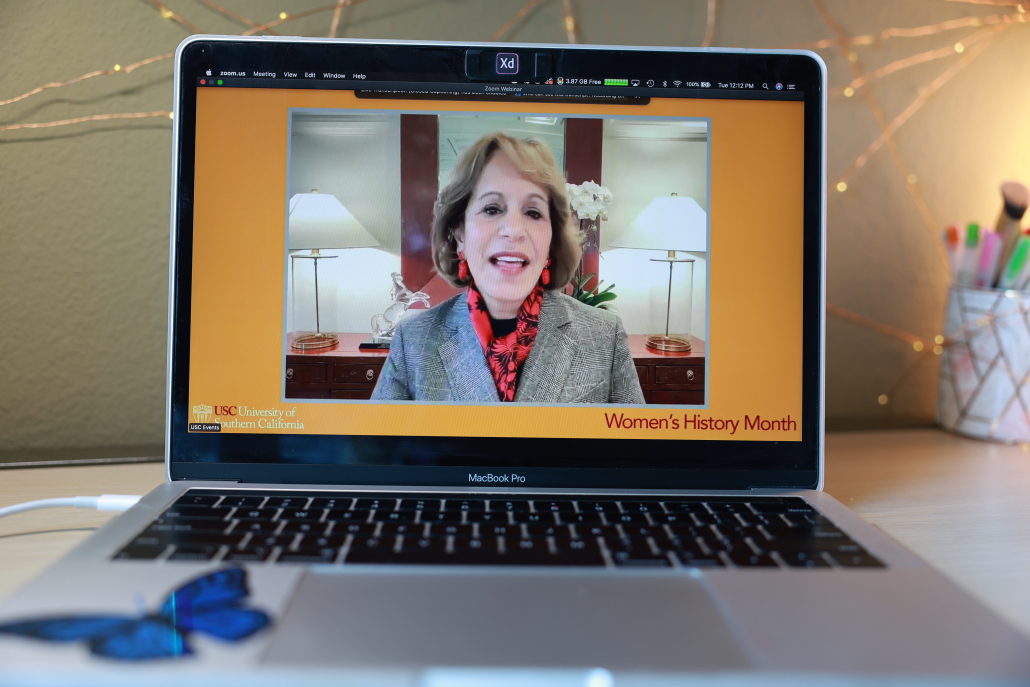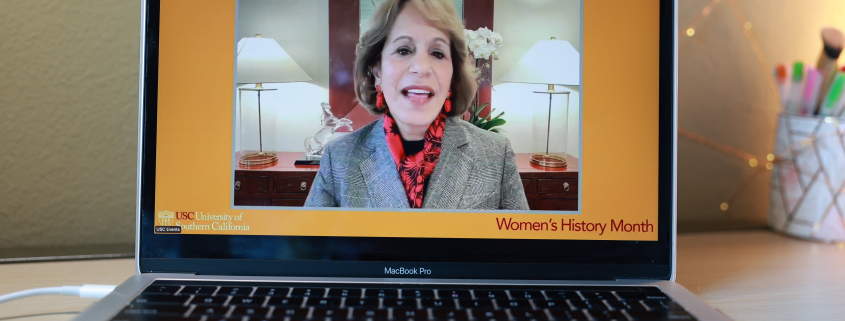USC hosts panel for Women’s History Month

In celebration of Women’s History Month, the USC Office of Cultural Relations and University Events hosted an online panel of USC-affiliated speakers and performers Tuesday. The event opened with Megan van der Toorn, student equity and inclusion programs manager of signature programs, commemorating the Tongva people, an Indigenous group that resided for thousands of years on what is now USC’s campus.
President Carol Folt, who opened the celebration, noted that “unlike most universities in America, USC was co-ed, diverse and international from its start in the late 1880s” and introduced the event’s theme: “Providing Healing, Promoting Hope.”
“There are healthcare workers, first responders, caregivers and service industry workers, and they’ve been working tirelessly since the beginning to offer healing and restore hope,” Folt said. “Today, we’re all thinking about all the tireless workers and women and children and families in Ukraine who are fighting so valiantly for their own freedom.”
Speaking on her first day as Dean of the Keck School of Medicine, Dr. Carolyn Meltzer took time to reflect on “the greatest joy in [her] own career” -— being a mentor for young women students.
“I recall bursting with pride when my first medical student mentee gave a talk at a national conference and again years later when she was honored as a distinguished physician scientist,” Meltzer said. “I look forward to meeting so many of you and to partnering to continue to accelerate our pace on this journey toward equity and excellence for women.”
Moderator Darby Saxbe, associate professor of psychology and co-director of the USC Center for the Changing Family, said the theme of the event “highlights and honors the critical work of women around the globe as caregivers and community healers,” but expressed her concern that the theme “may also lead into some gendered stereotypes of women being expected to be care providers.”
“We saw real collapse during the pandemic of some of the structures — daycares, schools, elder care facilities — that … support caregiving needs. And women took on a default burden of caregiving, and their workforce participation dropped as a result down to levels that we haven’t seen since the 1980s,” Saxbe said.
Dr. Natasha Sanchez Cristal, panelist and a fourth year resident of the LAC+USC emergency medicine program, said the pandemic “felt as if the world was on fire and we were standing there with mere buckets of water trying to survive.”
“Those are the stories that I now see when I reflect upon the pandemic. It’s the faces of so many women in our community who, despite their minimum wage salaries, were asked to risk exposure and work outside their homes as essential workers,” Cristal said. “[I see] the faces of the many who reassured their families and fought against all odds with such ferocious strength and faith.”
Panelist Dr. Parveen Parmar, an emergency physician and the director of the Center for Gender Equity in Medicine and Science at the Keck School of Medicine, noted that emergency providers witnessed firsthand the struggles their communities faced. Parmar commended caregivers that had to balance their personal lives, their families and their jobs.
Parmar not only spoke on the heightened responsibilities of emergency medicine workers during the pandemic but also the need to support female caregivers during this time.
“It would be ideal someday to be able to find ways for women to be able to thrive in their caregiving roles and at work and really share the burden in much more equitable ways,” Parmar said. “That’s something that we’re all working towards.”
LaToya Council, a panelist and a doctoral candidate studying sociology and gender studies, said Women’s History Month should be an opportunity to talk about the intersection of justice and health equity.
“In that sense, we think about communities of color, particularly Black communities,” Council said. “I’m thinking about Black women and the work that I do in my research, how community care and caregiving have been a response to large insistence of inequality, namely the race and gender oppression by the state, and how we have to combat those things.”
Parmar said Women’s History Month should also discuss the role of men in caregiving professions, adding that creating a more equitable society requires uplifting men “who support those goals,” and urged participants to begin breaking down the gender norms that “make caregiving a more female trait.”
Jessica Minsol Kim, panelist, senior majoring in environmental engineering and chief programming officer for the Undergraduate Student Government, iterated the central role that STEM jobs have in bridging gendered income disparities. Kim said her parents and teachers’ advocacy for women in STEM uplifted her ability to find economic independence outside of marriage.
Rachel Freeman-Cohen, panelist and a graduate student studying postsecondary administration and student affairs, talked about her personal experiences serving on the diversity and inclusion committee at UC Santa Cruz. Freeman-Cohen spoke of the “dismissiveness” she felt from committee members.
“I am reminded of how often people in my community who share similar intersections of identity are treated in academia,” said Freeman-Cohen in an interview with the Daily Trojan. “I do constantly wonder how it would look different after I walk across that stage and when I have the credentials … Will I be treated the same … Or will my degree speak for itself?”
Kim noted how women leaders in her life have shaped her ideals about leadership, and she encouraged participants to advocate for equity “in all aspects of life”.
“In personal experience … some of the leaders that I really looked up to were all women because they’re so nurturing, because they’re so empathetic and because they’re able to bring groups out of difficulties with such confidence and honesty,” Kim said. “This is a great time for us to think about how these traits make us great leaders too.”

